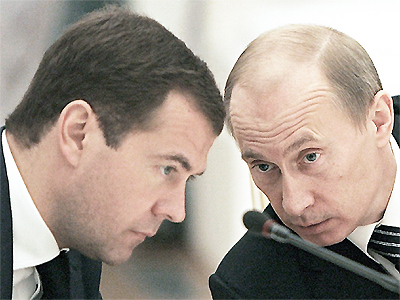Russian voters cut tandem down to size

file photoRussia's governing United Russia party has lost its constitutional majority in parliament, and may have lost its absolute majority of the national vote. With 95% of the votes counted, the party backing and backed by prime minister Vladimir Putin and president Dmitry Medvedev saw its share of the vote hover just under the 50% mark, down from a whopping 66% in 2007. Despite numerous allegations of falsification, the result is broadly in line with pre-election opinion polls and exit polls. Left, centre-left and nationalist parties gained at the expense of United Russia, thus unlikely to lend impetus to the stagnating reform process. The result will test to what extent the so-called loyal opposition of largely anti-Western parties really is loyal.
Russia's voters cut ruling party United Russia down to size, with the party seeing its share of the vote drop to just under 50% at December 4ths Duma elections, down from 66% in 2007. Despite overwhelming media backing and strong use of administrative levers party influence over state employees and regional election commissions the party saw its vote slashed by a surge in support for the red-brown opposition parties.
Russia's largely unreconstructed Communist Party took 19,13%, centre left Fair Russia, 13.18% and the nationalist Liberal Democratic Party 11.66%. The pro-reform liberal Yabloko party led by veteran Grigorii Yavlinsky took only 3.25% of the vote and thus failed to overcome the 7% cut-off threshold to enter parliament.
While media focus is on the sharp fall in the United Russia vote compared to 2007, the pro-Putin party's tally still remained considerably above its 2003 vote of 37.5% which was at the time considered highly successful, and presented no problems for the government to get legislation through the chamber.
Still, considering the electoral resources employed by the Kremlin and United Russia, the vote is a slap in the face for President Dmitry Medvedev and Prime Minister Vladimir Putin, who are due to swap places following presidential elections in March 2012 which Putin is seen as certain to win. In a short speech at United Russia campaign headquarters, Putin called the results optimal and reflecting the real situation in the country. "Based on these results, we will be able to ensure the stable development of our country," Putin added, according to RIA Novosti.
President Dmitry Medvedev said "a 50-percent result testifies to a real democracy." "We will have to take into account the more complex configuration of the Duma and for some issues we will have to join coalition bloc agreements," Medvedev said, according to RIA Novosti. He blamed the drop in the party's vote on the aftermath of the 2009 economic crisis that saw Russia's GDP drop by 7% after years of stellar growth.
There has been media speculation that the disappointing result could cost Medvedev his promised future job as prime minister. Medvedev has said he will cede his place to Putin as United Russia presidential candidate and overwhelming favourite in presidential elections March 2012. Putin shortly before the elections reaffirmed that Medvedev was his candidate as prime minister.
With votes for parties failing to cross the 7% threshold being redistributed to the parties who enter parliament, United Russia will likely hold a slim absolute majority in the new Duma, say analysts. It remains to be seen whether the opposition parties form a coherent opposition, or get coopted into supporting the next government.
Most intrigue will center on the left-leaning Fair Russia party that took around 14% of the vote. Fair Russia was established by a Putin associate from St Petersburg, Sergei Mironov, speaker of the upper house of the Russian Parliament, in the run up to the 2003 Duma elections. The party was apparently originally intended as a spoiler party to take votes off the Communist Party. But since then it has become a bitter rival of the United Russia party, and come under considerable pressure, including the removal of Mironov from his post as chairman of the Federation Council.
The election results thus bring some more plurality into the political system, and indicate growing dissatisfaction with the slowing economy and stagnating political life. But in the absence of any pro-market parties in the new parliament, the results are unlikely to stimulate reforms, and instead likely to accelerate spiraling social expenditure and weakening budget discipline.
Parties receiving less than the 7% barrier receive no seats in the parliament, supporting the Communists as a prominent second party was the most obvious way to vote against United Russia in the absence of a legal means to express this view, said Alfa Bank analyst Natalia Orlova in a research note. We do not see this necessarily as nostalgia for Soviet times, but rather as an indication of protest voting.
It remains to be seen whether the votes for opposition parties were simply made in protest against United Russia, rather than in support of alternative policies, commented Peter Westin of Aton brokerage. The Russian government faces a huge task in diversifying the economy, Westin continued. This challenge becomes considerably more complicated when the government must choose between short-term actions that are popular with an increasingly frustrated electorate and difficult longer-term structural reforms.

